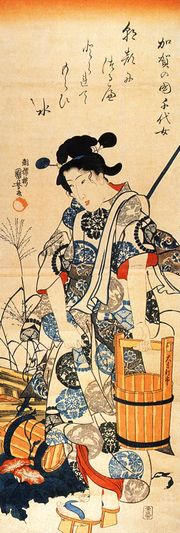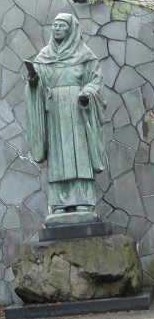فوكودا تشييو-نو

فوكودا تشييو-نو (سيدة كاگا نو تشييو) (福田 千代尼؛ Fukuda Chiyo-ni؛ عاشت 1703 - 2 أكتوبر 1775) كانت شاعرة يابانية في فترة إدو, widely regarded as one of the greatest poets of haiku (then called hokku). Some of Chiyo's best works include The Morning Glory, Putting up my hair, and Again the women.
Being one of the few women haiku poets in pre-modern Japanese literature, Chiyo-ni has been seen an influential figure. Before her time, haiku by women were often dismissed and ignored. She began writing Haiku at seven and by age seventeen she had become very popular all over Japan and she continued writing throughout her life. Influenced by the renowned poet Matsuo Bashō but emerging and as independent figure with a unique voice in her own right, Chiyo-ni dedication toward her career not only paved a way for her career but it also opened a path for other women to follow. Chiyo-ni is known as a "forerunner, who played the role of encouraging international cultural exchange".[1]
She is perhaps best known for this haiku:
morning glory!
the well bucket-entangled,
I ask for water[2]
Today, the morning glory is a favorite flower for the people of her home town, because she left a number of poems on that flower.[3] Shokouji temple in Hakusan contains a display of her personal effects.
. . . . . . . . . . . . . . . . . . . . . . . . . . . . . . . . . . . . . . . . . . . . . . . . . . . . . . . . . . . . . . . . . . . . . . . . . . . . . . . . . . . . . . . . . . . . . . . . . . . . . . . . . . . . . . . . . . . . . . . . . . . . . . . . . . . . . . . . . . . . . . . . . . . . . . . . . . . . . . . . . . . . . . . .
سيرتها
وُلِدت تشييو-نو في ماتـّو، مقاطعة كاگا (هي الآن هاكوسان، محافظة إيشيكاوا)، في فبراير 1703، كأكبر بنات معلق لفافات. At an early age, Chiyo-ni was introduced to art and poetry, and she began writing haiku poetry at the age of seven. By the age of seventeen, she had become very popular all over Japan for her poetry.
Her poems, although mostly dealing with nature, work for a unity of nature with humanity. Her own life was that of the haikai poets who made their lives and the world they lived in one with themselves, living a simple and humble life. She was able to make connections by being observant and carefully studying the unique things around her ordinary world and writing them down.[2]
At age twelve, Chiyo-ni's studied under two haiku poets who had themselves apprenticed with the great poet Matsuo Bashō, and many in her time saw her as one of Bashō's true heirs, both in her poetry and in her humble attitude of warm awareness toward the world and her simple living. She studied Basho's style of writing poems in her early years, although she did develop on her own as an independent figure with her own unique voice.[2]
She was well aware of being considered Bashō's heir and on a portrait of Bashō she wrote in Calligraphy:
To listen,
fine not to listen, fine too...
nightingale[4]
She appears to say that while she did listen to him, she also did not copy him, "not to listen, fine too."
In around 1720 she married a servant of the Fukuoka family of Kanazawa, and had one child with him, a son, who died in infancy. Her husband died of disease not long after in 1722. She valued her independence too much, and despite her loneliness, she did not remarry, so she returned home to her parents.
It may be that after her husband's death Chiyo-ni lived with and cared for her elderly parents and worked in the families scroll mounting business. She wrote:
parents older than I
are now my children
the same cicadas[5]
After her parents died, she adopted a married couple to carry on the family business and in 1754, at the age of fifty-two (by East Asian age reckoning), Chiyo-ni chose to become a Buddhist nun. "Not", she said, "in order to renounce the world, but as a way 'to teach her heart to be like the clear water which flows night and day."[6] Chiyo-ni shaved her head and started to live in a temple with other nuns and took the Buddhist name Soen. She continued her writing and lived the rest of her simple yet peaceful life in the manner of haikai.[3]
In 1764, she was chosen to prepare the official gift for Maeda Shigemichi, the daimyō of her region, to the Korean Delegation led by civil minister Jo Eom. Chiyo-ni crafted and delivered 21 artworks based on her twenty-one haiku.[1]
Chiyo-ni died in 1775.
قصائد هايكو لم تقلها ولكنها تُنسب إليها
- "Wake up and sleep and see how large a bed of mosquito nets" is widely distributed as a phrase for a Chiyo woman, but it is not actually a Chiyo woman's work, but a phrase written by a prostitute named Ukihashi in the Genroku era before her .
- The phrase “Dragonfly fishing, how far did you go today” quoted by Issa is considered to be legendary, not in more than 1,700 phrases in his lifetime.
في الثقافة الشعبية
- The American rock band Red House Painters adapted one of Chiyo's haiku for the chorus of their song "Dragonflies".
انظر أيضاً
المراجع
- ^ أ ب "About Chiyo-Jo Haiku Museum - Chiyo-Jo Haiku Museum". haikukan.city.hakusan.ishikawa.jp.
- ^ أ ب ت trans. Donegan and Ishibashi, 1996 p172
- ^ أ ب Patricia Donegan and Yoshie Ishibashi. Chiyo-ni: Woman Haiku Master, Tuttle, 1996. ISBN 0-8048-2053-8 p256
- ^ trans. Lenore Mayhew
- ^ trans. Jane Reichhold
- ^ Jane Hirshfield

